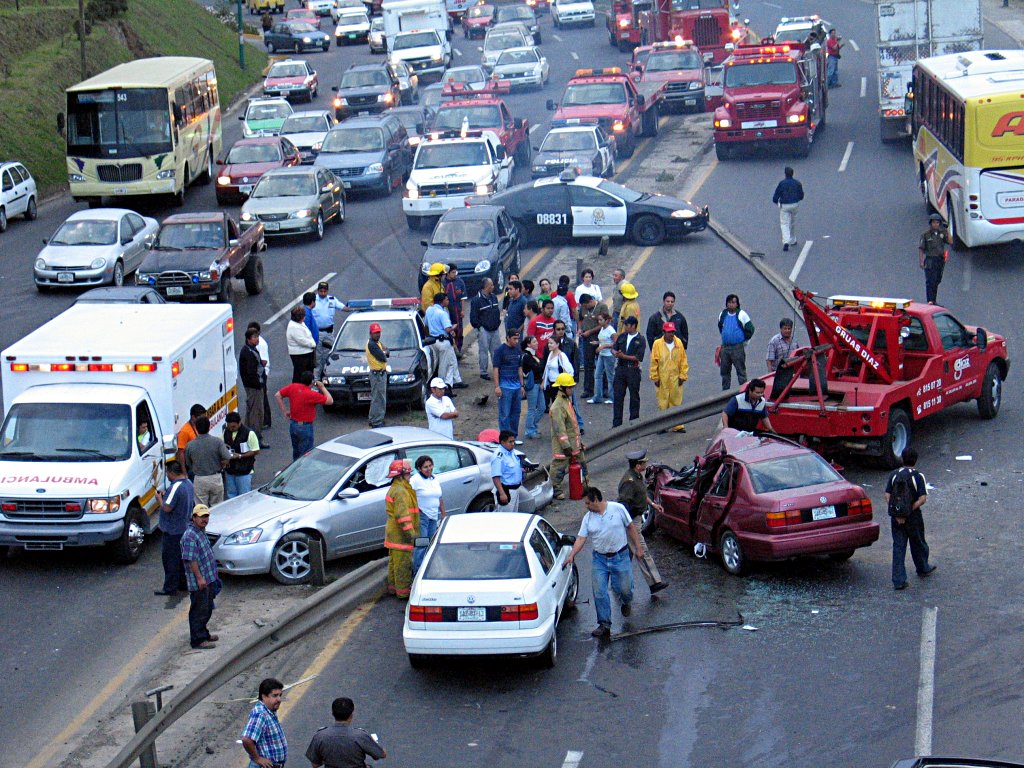I don't believe in the word "accident" when it comes to vehicle collisions. When one vehicle collides with another, it is almost always because somebody was doing something stupid or wasn't paying attention. In the case of mechanical problems or road conditions, maybe it wasn't sheer stupidity but there is still a cause and ways of avoiding it (better maintenance of vehicle, adding extra following distance when ice may be present on the road). Thus, when I am significantly delayed by an accident on the freeway, it infuriates me. I believe that people who cause collisions should be penalized much more than today's penalty structure allows. It is not just damage to the vehicle, or injury to the innocent victim that needs to be compensated for. Every person who is delayed suffers because of one person's poor driving decisions. In addition, I believe that if the penalty for causing a collision was significantly higher, people would be incentived to drive safer and pay better attention, which is a huge win for society if we can reduce so-called accidents.
First, let me say that my gut reaction is that anyone who causes a collision during rush hour that causes significant delays for so many people should have his license revoked permanently and/or car seized and/or shipped out of state/deported. That's my gut reaction. But I know that's not realistic, nor do I really want to live in a society that is so unforgiving. I had an economics teacher joke (in half seriousness) that if everyone's vehicles were equipped with an irremovable knife jarring out of the steering wheel, nobody would drive unsafely; the implication that the safer our cars become, the more our drivers will feel invincible and cause more crashes. So taking a step down from such an extreme view, here's how I would structure penalties for causing vehicle collisions.
A model would be developed using traffic statistics organized by day of the week, time of the day and direction of travel. Then, when a collision is reported, the model would determine how many drivers would be delayed as a result. A similar model would be applied based on the severity of the collision and resulting road blockage to determine a standard amount of time allowance for clean up. Based on these two models, each collision would have a significant penalty. The guilty driver will have to pay this fee into a pool collected by the city or state, in addition to paying for direct damages and medical expenses like normal. If the guilty driver cannot pay this fee, he forfeits his license and is not allowed to drive until such time as he has paid it back in full, or performed the equivalent amount of community service time at $5 per hour, or any combination of the two. At the end of the year, the pool is distributed evenly to every person in the region who has (1) a valid driver's license, (2) valid car registration and (3) a clean record with no accidents or traffic tickets. The payout can be pro-rated for individuals who had car registration or a license for only part of the year. However, if there is any recorded accident or traffic ticket, the driver is disqualified for the year in which those incidents occurred.
Let's take for example a standard collision, blocking one lane of traffic for 30 minutes during rush hour. I'll say that this delay is valued at $10 to every driver immediately impacted. If 500 drivers are assumed to be impacted while the accident is being cleaned up, then the penalty starts at $5000. If the accident happened at the beginning of rush hour, around 4:30 pm, then traffic doesn't just resume normality after the accident is cleaned up, so another 1000 drivers are inconvenienced at a value of $2.50. So now the fee is up to $7500. With 100 such accidents per year, we'd have a pool of about $750,000. Let's say there are 10,000 drivers who qualify for the payout, so each driver would get a nice little check for $75. It's not a huge bonus, but it's a nice way for the city or state to say, "Thank you for being a safe driver this year, here's compensation for the idiots who were not as smart and safe with their driving." And I think that's dandy.
Now, let's look at actual numbers. The following stats are from 2013 Arizona DOT's report on crashes. There were 4,826,903 licensed drivers in AZ, and 107,348 crashes. There were 76,335 crashes in Maricopa alone. Of Arizona crashes involving multiple cars, 45.98% were rear ends, 71.66% were in daylight, 86.45% were on days with clear skies, and 93.2% were on dry roads. That is to say that nearly 50% of car-on-car collisions could have and should have been avoided. On weekdays, between the hours of 6 am and 9 am, there were 14,837 accidents. Between the hours of 4 pm and 7 pm on weekdays, there were 20,624 accidents.
Following my model, the 35,461 accidents during morning and evening rush hours could have contributed up to $2.7 billion to the proposed pool. Assuming the 4.8 million licensed drivers maintained current registration throughout the year on at least one vehicle, and even ignoring the fact that probably 100,000 of those people would not get the reward because they caused accidents, that would amount to $550 per person as compensation for being inconvenienced by car accidents. That number could go up if you consider longer hours of impact, or if my model underestimated the number of impacted drivers. But even still, I'd take $550 for being inconvenienced, no problem.


No comments:
Post a Comment